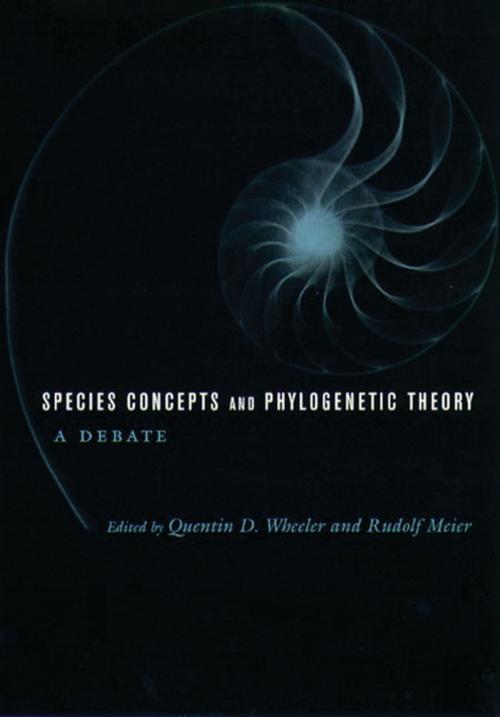Species Concepts and Phylogenetic Theory
A Debate
Nonfiction, Science & Nature, Science, Biological Sciences, Evolution| Author: | ISBN: | 9780231506625 | |
| Publisher: | Columbia University Press | Publication: | June 22, 2000 |
| Imprint: | Columbia University Press | Language: | English |
| Author: | |
| ISBN: | 9780231506625 |
| Publisher: | Columbia University Press |
| Publication: | June 22, 2000 |
| Imprint: | Columbia University Press |
| Language: | English |
No question in theoretical biology has been more perennially controversial or perplexing than "What is a species?" Recent advances in phylogenetic theory have called into question traditional views of species and spawned many concepts that are currently competing for general acceptance. Once the subject of esoteric intellectual exercises, the "species problem" has emerged as a critically important aspect of global environmental concerns. Completion of an inventory of biodiversity, success in conservation, predictive knowledge about life on earth, management of material resources, formulation of scientifically credible public policy and law, and more depend upon our adoption of the "right" species concept.
Quentin D. Wheeler and Rudolf Meier present a debate among top systematic biology theorists to consider the strengths and weaknesses of five competing concepts. Debaters include (1) Ernst Mayr (Biological Species Concept), (2) Rudolf Meier and Rainer Willmann (Hennigian species concept), (3) Brent Mishler and Edward Theriot (one version of the Phylogenetic Species Concept), (4) Quentin Wheeler and Norman Platnick (a competing version of the Phylogenetic Species Concept), and (5) E. O. Wiley and Richard Mayden (the Evolutionary Species Concept).
Each author or pair of authors contributes three essays to the debate: first, a position paper with an opening argument for their respective concept of species; second, a counterpoint view of the weakness of competing concepts; and, finally, a rebuttal of the attacks made by other authors. This unique and lively debate format makes the comparative advantages and disadvantages of competing species concepts clear and accessible in a single book for the first time, bringing to light numerous controversies in phylogenetic theory, taxonomy, and philosophy of science that are important to a wide audience. Species Concepts and Phylogenetic Theory will meet a need among scientists, conservationists, policy-makers, and students of biology for an explicit, critical evaluation of a large and complex literature on species. An important reference for professionals, the book will prove especially useful in classrooms and discussion groups where students may find a concise, lucid entrée to one of the most complex questions facing science and society.
No question in theoretical biology has been more perennially controversial or perplexing than "What is a species?" Recent advances in phylogenetic theory have called into question traditional views of species and spawned many concepts that are currently competing for general acceptance. Once the subject of esoteric intellectual exercises, the "species problem" has emerged as a critically important aspect of global environmental concerns. Completion of an inventory of biodiversity, success in conservation, predictive knowledge about life on earth, management of material resources, formulation of scientifically credible public policy and law, and more depend upon our adoption of the "right" species concept.
Quentin D. Wheeler and Rudolf Meier present a debate among top systematic biology theorists to consider the strengths and weaknesses of five competing concepts. Debaters include (1) Ernst Mayr (Biological Species Concept), (2) Rudolf Meier and Rainer Willmann (Hennigian species concept), (3) Brent Mishler and Edward Theriot (one version of the Phylogenetic Species Concept), (4) Quentin Wheeler and Norman Platnick (a competing version of the Phylogenetic Species Concept), and (5) E. O. Wiley and Richard Mayden (the Evolutionary Species Concept).
Each author or pair of authors contributes three essays to the debate: first, a position paper with an opening argument for their respective concept of species; second, a counterpoint view of the weakness of competing concepts; and, finally, a rebuttal of the attacks made by other authors. This unique and lively debate format makes the comparative advantages and disadvantages of competing species concepts clear and accessible in a single book for the first time, bringing to light numerous controversies in phylogenetic theory, taxonomy, and philosophy of science that are important to a wide audience. Species Concepts and Phylogenetic Theory will meet a need among scientists, conservationists, policy-makers, and students of biology for an explicit, critical evaluation of a large and complex literature on species. An important reference for professionals, the book will prove especially useful in classrooms and discussion groups where students may find a concise, lucid entrée to one of the most complex questions facing science and society.















